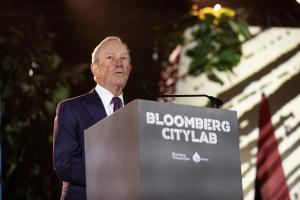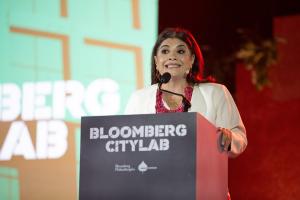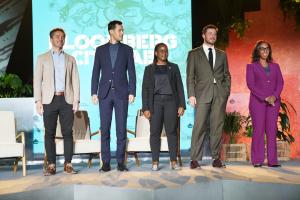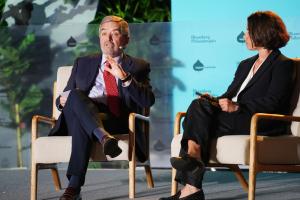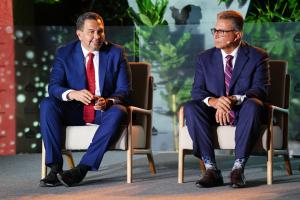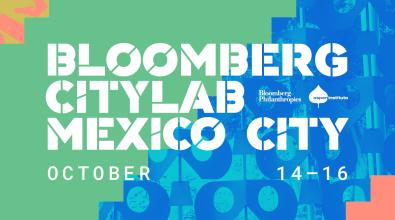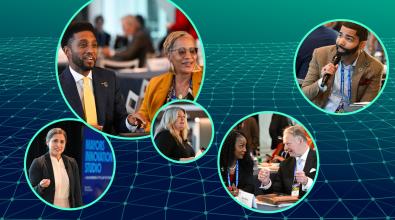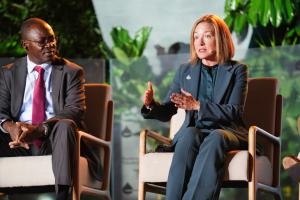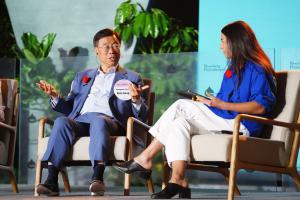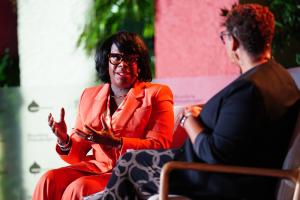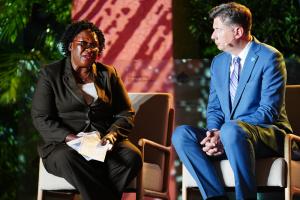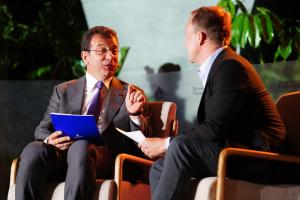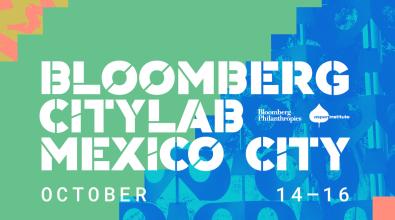 Read More
Read More
The most memorable moments from Bloomberg CityLab 2024
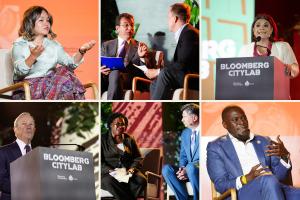
Photos courtesy of Bloomberg Philanthropies
Listen to This Article
When more than 700 mayors, civic leaders, urban experts, and creatives gathered in Mexico City for the 11th Bloomberg CityLab last week, they dug deeply into a host of complex challenges and the innovative ways cities are tackling them. They also shared insights into where public innovation is headed next—and how cities can propel entire nations forward. As James Anderson, who leads the Government Innovation program at Bloomberg Philanthropies, told attendees, “Equipping mayors is not just cities work. It’s nation-building.”
At center stage this year were many of the most pressing issues facing today’s local leaders, including affordable housing, migration, climate, population growth, democracy, and much more. Here are standout moments from this year’s preeminent global cities summit.
Radically reimagining the services residents depend on.
Michael R. Bloomberg, the 108th mayor of New York City and founder of Bloomberg L.P. and Bloomberg Philanthropies, kicked off the final day of this year’s summit with a major announcement: the launch of Bloomberg Philanthropies’ largest-ever Mayors Challenge. For more than a decade, this signature ideas competition has spurred government innovation that has improved lives in cities around the world. And, as Bloomberg announced at CityLab, this year’s Challenge calls on leaders to hone and test groundbreaking ideas for bringing innovation to their core services, such as public transportation, waste management, housing, and emergency response. Fifty finalists will receive $50,000 and participate in an Ideas Camp to hone, model, and test their concepts, and 25 of those cities will each receive $1 million to bring their solutions to life. (Watch the video.)
Learn more about the 2025 Mayors Challenge—which is open to cities across the world with 100,000 or more residents—and how to apply here.
Transforming the city experience with next-generation public infrastructure.
Less than two weeks after she took office, Mexico City’s new mayor, Clara Brugada, welcomed the world’s mayors to her city and explained how CDMX—already heralded as the digital capital of the Western Hemisphere—will continue to lead the way.
“We're going to create a very powerful infrastructure that has more than 200 centers for childcare and development,” she vowed, emphasizing the need for “large, transformative projects of infrastructure, sports, recreation, well-being, and care-taking.”
Brugada’s plan includes scaling a community-center concept she pioneered as mayor of Mexico City’s most populous borough, Iztapalapa, across the entire city. These Utopias offer residents an incredible array of health, education, and cultural services, including everything from music lessons to addiction treatment to job training. “The idea behind this project [is] to make these utopian dreams to transform public space real,” Brugada explained. (Watch the video.)
Achieving breakthroughs on affordable housing across the globe.
With local leaders everywhere stressing that affordable housing remains one of their biggest challenges, this year’s CityLab spotlighted some of the most promising solutions from every corner of the world. These included an effort in Atlanta to repurpose shipping containers into homes, a project in Windhoek, Namibia, to integrate informal settlements into local housing infrastructure, work in Renca, Chile, to emphasize density as a way to help thousands of multi-generational families stay together, and much more. (Watch the video.)
Peeking inside a new national government built on city innovation.
Former Mexico City Mayor Claudia Sheinbaum, who made global headlines when she became the country’s first female president earlier this month, demonstrated that cities are still on the top of her mind by sending two cabinet members to the CityLab stage.
José Antonio Peña Merino, who spearheaded the local digital transformation under then-Mayor Sheinbaum and is now serving as head of Mexico’s brand-new Telecommunications and Digital Transformation Agency, shared how the new administration plans to scale their citywide success across the country. Their vision: Building a national school to train public officers on how to guide digital efforts across every level of government, and slashing in half the number of formal processes residents need to navigate across their lives. “We have to remember that every interaction with the government opens up a door,” Merino said. (Watch the video.)
And the country’s new Foreign Secretary, Juan Ramón de la Fuente, explained that cities will serve as main characters in President Sheinbaum’s push for global progress—especially when it comes to climate change. “We need cities to be not only part of [climate efforts], we need cities to lead us,” he said. (Watch the video.)
Sharing insights from the frontlines of migration.
While Las Cruces, N.M., and Juárez, Mexico, are on opposite sides of a politically charged international border, their mayors, Eric Enriquez of Las Cruces and Cruz Pérez Cuéllar of Juárez, say they can’t work without each other’s interest in mind. That’s especially the case given that their cities represent the largest bilingual and binational workforce in the Western Hemisphere. In fact, their partnership helps them overcome an ugly stew of anti-immigrant rhetoric and misinformation. “We are in a different reality. We communicate very well with one another,” Juárez’s Cuéllar said of Las Cruces’ Enriquez. (Watch the video.)
Meanwhile, Denver Mayor Mike Johnston and Guatemala City Mayor Ricardo Quiñónez Lemus discussed how differently cities are experiencing migration—especially when one city is welcoming waves of newcomers while another is seeing an exodus. The common denominator, Johnston explained, is a need to focus on the people affected by—and helping respond to—the crises. “It is easy in this moment to lose track of the humanity of this conversation, and I just want to attest to you from a city on the front lines: People are fundamentally deeply good in these moments,” he said. “There is an opportunity to turn this crisis into a benefit.” (Watch the video.)
Showcasing game-changing ideas that can work everywhere.
With city leaders hungry to replicate solutions that work but sometimes lacking the capacity to adapt them locally, Patricia E. Harris, CEO of Bloomberg Philanthropies, announced the first slate of ideas to enter the Bloomberg Cities Idea Exchange. The initiative identifies evidence-backed solutions and accelerates their spread to cities around the world with support ranging from idea tours to technical assistance.
As she unveiled the initial solutions to hit the exchange—from low-cost sensors that track air pollution to Atlanta’s shipping containers that now serve as housing—Harris emphasized the exponential potential of systematic idea sharing. “These 11 ideas address a wide variety of challenges and are backed by exciting results—and they all have the potential to make a great impact,” she said. (Watch the video.)
Learn more and register for the pro-bono Bloomberg Cities Idea Exchange here.
Pulling cities back from the brink of water crisis.
As water scarcity grows dangerously worse in cities worldwide, CityLab offered insight into how leaders are taking action before it’s too late.
Boise, Idaho, Mayor Lauren McLean recounted a decade-long effort to engage residents around a major new water-recycling initiative that is set to divert six million gallons per day for purification. Montevideo, Uruguay, Mayor Mauricio Zunino described the whole-of-city data strategy that helped deliver nearly a million liters of water to residents when the city’s drinking water was compromised. And Nahashon Muguna, managing director of the Nairobi Water and Sewage Corporation, shared how his city has handled a massive shortfall: by using robust communication and planning to build trust with residents. (Watch the video.)
Using city innovation to get into the business of love.
While mayors must often get their hands dirty tackling messy challenges, they can also benefit from wearing their hearts on their sleeves. For Mayor Shin Sang-Jin of Seongnam City, South Korea, that means literally getting involved with romance.
“South Korea has got a serious problem with fertility rates,” he told CityLab. Now, with an initiative called Solomon’s Choice—which is being replicated in cities across the country—the local government is providing a forum for single residents to date, and even offering them supports such as relationship coaching. The value of this work, the mayor explained, is not just for the residents who might find romance, but for the larger social fabric. “The individuals who are connected with love, and how they exist under the umbrella of love—that will sustain cities,” he said. (Watch the video.)
Engineering a remarkable turnaround in public safety.
While violent crime is down in many cities, plenty of others are still grappling with major public-safety challenges. Philadelphia’s Mayor Cherelle Parker provided inspiration to leaders in either situation as she shared how her city cut homicides by 37 percent and, as a result, has just experienced one of its least violent years in decades. In describing Philadelphia’s success, Parker also provided other mayors a blueprint for taking on root causes of violence, explaining how her 100-day action plan (an accompanying progress report can be found here) has powered change. (Watch the video.)
Tapping networks to make a new city an overnight star.
As mayors explored how city networks strengthen their innovation efforts, one leader of a city that didn’t even exist five years ago—Masaka, Uganda—offered an emotional account of the benefits of connecting with other leaders around the world.
Mayor Florence Namayanja, whose municipality was granted city status in 2019, explained that city networks have been crucial as her administration scales up its capacities and its ambitions. Citing an old adage that “no man is an island,” she specifically credited the African Mayoral Leadership Initiative (AMALI) with helping her get involved with the Youth Climate Action Fund—both of which are supported by Bloomberg Philanthropies. It’s been remarkable, she said, to see her city not just become visible, but a global leader. “Now, my city is an international city,” she said. (Watch the video.)
Activating—and drawing inspiration from—dynamic youth leaders.
With roughly 60 percent of young people indicating they are “extremely” or “very” worried about climate change, youth are the natural foot soldiers for climate action in cities. And at CityLab, 39-year-old Governor Sakaja Johnson, who leads Nairobi—a city on a continent where the median age is 19—offered simple ways to begin engaging them. “There used to be an old colonial rule in Nairobi that you can't take photos in the city center,” he said. “And one of the first decisions I made as an executive order was to repeal that. I said, ‘Look guys, if you want to take photos, come take photos.’ Now, if you come to Nairobi on a weekend, it looks like an outdoor studio. There are young people with their umbrellas and with their lights, and they're on Instagram, they're on TikTok, they’re creating content and earning a living.
“That makes me really happy and it encourages me that you can make an impact just by listening to the people and not being rigid,” he explained. (Watch the video.)
A young person who is now being heard is Jessica Lima, who—with support from the Bloomberg Philanthropies Youth Climate Action Fund—is leading on better ways to sort waste in Guatemala City. Along with other participants in the Fund, she offered insight into how cities can work with young people to power solutions. “Be our allies, not just our representatives,” Lima urged leaders. (Watch the video.)
Marshaling innovative governance to bring solidarity to life.
As cities everywhere look for new ways to better connect residents, Istanbul Mayor Ekrem İmamoğlu presented a proven example of how to do so. As part of a Mayors Challenge-winning effort called Pay it Forward, his team pioneered a platform to help residents help each other. It started with covering utility bills in a time of pandemic-era hardship, before the city repurposed the platform to help residents recover after a catastrophic earthquake. Dozens of cities across Turkey have worked to adopt this approach as a vehicle for local solidarity.
But Istanbul’s Mayors Challenge work doesn’t exist in a vacuum. It’s part of a suite of initiatives and governance structures that key on robust engagement, including simple steps like turning a swimming pool at the mayor’s residence into a pool of ideas for joint planning. “The Istanbul Model is driven by three core pillars: solidarity, development, and welfare,” he explained in conversation with Bloomberg Philanthropies’ James Anderson. “These principles guide every policy we implement.”
A larger goal for this work is redefining populism—Mayor İmamoğlu calls his approach “democratic people-ism”—which is critical when authoritarians are using traditional populism to chip away at the bonds that bring city residents together. As Mayor İmamoğlu put it, “In Istanbul, we have proven that a city administration can build an empathic bridge when it’s needed most.” (Watch the video.)
